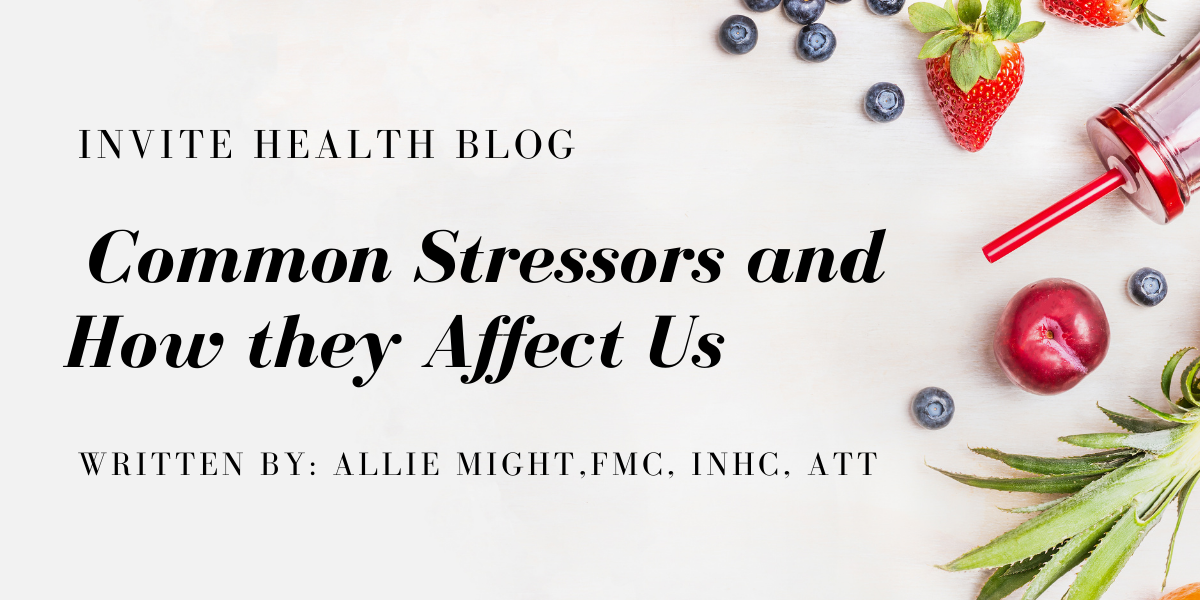Common Stressors and How They Affect Us

Written By: Allie Might, FMC, INHC, ATT
For further questions or concerns email me at amight@invitehealth.com
Everyone experiences stress throughout their life. There’s no way to avoid stress all together. But what do you know about how to handle these situations and can stress effect our well-being? Let’s take a look at some common stressors and some strategies to help short and long term.†
WHAT EXACTLY IS STRESS?
The American Psychological Association defines stress as “a normal reaction to everyday pressures but can become unhealthy when it upsets your day-to-day functioning”. Stress can not only affect our mental health and mood but can also affect our physical health. Areas such as the immune system, circulatory system and even our sleep can be negatively impacted. †
So, what are some of the common things that can cause stress? How does stress affect our well-being? While we’re all affected by different things, WebMD has put together some of the most common stressors that seem to affect so many of us, as well as some of the signs that these stressors may be causing a negative impact. Some of these include, but are not limited to the following: †
- Job/career related (i.e.: hours, conditions, harassment, difficult colleagues) †
- Death of a loved one†
- Illness, personal or of a loved one†
- Moving†
- Marriage/divorce/break-up†
- Traumatic events (i.e.: natural disasters, personal trauma, “state-of-the-world”) †
These are areas we have or will all experience throughout our life. Understanding how these affect us as an individual can be a helpful tool as we learn to manage our daily stressors. Some common signs to be aware of may include, but are not limited to, the following: †
- Headaches/migraines†
- Sleep problems†
- Digestive issues†
- High Blood Pressure†
- Loss of appetite†
- Decreased libido†
- Auto-Immune flare-ups†
While some of these can be easily managed, speaking to your doctor can be incredibly beneficial in navigating and managing extreme stress and the impact it can cause to the body.†
When it comes to ways to manage stress, the Center for Disease Control and Prevention (CDC) offers some very helpful guidelines. Some of my favorites you may want to try, are the following suggestions: †
- TAKE A BREAK. Try refraining from social media and the news for a period of time. Try an afternoon, a day or even a week. †
- SELF CARE. Take care of yourself and relax. Try exercise, journaling, meditation, enjoying a cup of tea and your favorite movie, or even snuggling your fur-baby (if you have one).). †
- GET HEALTHY. Prepare a healthy meal and substitute water for alcohol.†
- COMMUNICATE AND HAVE FUN. Talk to friends or family. Maybe plan to get together and do something fun.†
- ASK FOR HELP. Seeking the help of a doctor can be incredibly helpful.†
Hopefully you find these as helpful as I have in the past. †
NUTRIENTS FOR STRESS AND SLEEP SUPPORT – INVITE HEALTH PODCAST, EPISODE 507>>Listen now!
Something else to consider is a nutrient called Phosphatidylserine. While many people associate this with general brain health/memory, it has been studied for its benefits on the side effects of stress. The National Library of Medicine/National Center for Biotechnology Information has done some interesting studies on this topic. One such study suggests its benefits when taken with on Omega-3 supplement. This has shown that this combination can help reduce chronic and acute stress and its effects on the body. Another study they’ve published shows that adding phosphatidylserine can help to reduce cognitive stress while performing tasks. This can allow for better mental focus, as well as a reduction of cortisol (stress hormone). This allows one to be more relax and connected to the task. †
REFERENCES
https://www.apa.org/topics/stress
https://www.mentalhealth.org.uk/explore-mental-health/a-z-topics/stress
https://www.webmd.com/balance/guide/causes-of-stress
https://www.cdc.gov/violenceprevention/about/copingwith-stresstips.html
https://pubmed.ncbi.nlm.nih.gov/22575036/
https://pubmed.ncbi.nlm.nih.gov/18616866/


